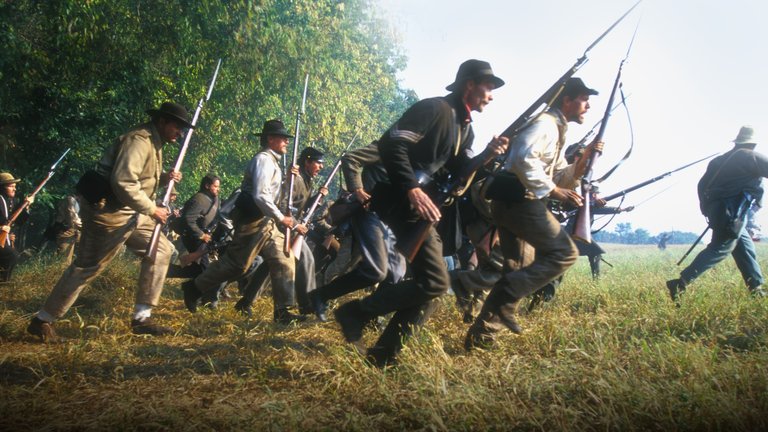Film Review: Gods and Generals (2003)

If current trends continue, the US Civil War might represent a challenge to future archaeologists due to the absence of monuments and memorials. They are being removed under the pressure of influential “wokesters,” apparently unhappy over a conflict fought mainly by white cisgender heterosexual Christian men. This iconoclastic process might be seen as misguided and catastrophic in the long term; however, it may have originated from some sound arguments and legitimate grievances against certain questionable interpretations of the US Civil War, one of which is used in Gods and Generals, the 2003 epic directed by Ronald F. Maxwell, known as one of the most controversial Hollywood films of the 21st century.
Gods and Generals represents a prequel to Gettysburg, the 1993 two-part television miniseries that is highly regarded as one of the most spectacular, ambitious, and accurate screen depictions of the US Civil War. The series dealt with the eponymous 1863 battle and was based on The Killer Angels, a Pulitzer Prize-winning novel by Michael Shaara. His son Jeffrey Shaara wrote Gods and Generals in 1996, depicting the two years before the battle, followed by Last Full Measure in 1998, which covered events after the battle. These three novels are often seen as part of a trilogy. The film was produced by media mogul Ted Turner, the producer of Gettysburg, who wanted to adapt the two remaining novels.
The plot begins in spring 1861 when the highly respected US Army engineering officer Robert E. Lee (played by Robert Duvall) resigns from his commission after his native state of Virginia secedes from the Union and later joins the newly created Confederate States Army. Major Thomas Jonathan Jackson (played by Stephen Lang), a professor at the Virginia Military Institute, also joins the CSA. At the same time, Joshua Chamberlain (played by Jeff Daniels), a college professor from the Northern state of Maine, joins the 20th Maine Infantry Regiment of the Union Army. The plot primarily focuses on Jackson, who proves to be an immensely talented military leader, earning the nickname “Stonewall” during the First Battle of Bull Run. Jackson would later fight under Lee, whose Army of Northern Virginia, despite being numerically and technically inferior to Union forces, scores spectacular victories at the battles of Fredericksburg in December 1862 and Chancellorsville in May 1863, during which Jackson is mortally wounded.
Gods and Generals was, like Gettysburg, an impressive effort in terms of scale. Its budget of $60 million, provided mostly from Turner’s own pocket, resulted in spectacular recreations of major battles with a large number of extras and great attention to period details. However, inevitable comparisons between the two clearly pointed towards the latter film being vastly inferior. The most notable differences are in the cast, with some members unable to reprise their roles from ten years earlier and being replaced, not always with the best results. Martin Sheen, who effectively played Lee in Gettysburg, is replaced by the much blander and less impressive Robert Duvall. Stephen Lang, who made a great impression as the unfortunate General Pickett ten years earlier, here plays the completely different character of Stonewall Jackson. Only Jeff Daniels reprises the role of Joshua Chamberlain, which is rather unimpressive due to the poor script and bad dialogue.
Another issue that plagues Gods and Generals is its length, which is rather unsuitable for a film covering two years of war. Originally, it was supposed to be made in two parts or released as a miniseries, but in the end, the decision was made to turn it into a feature film lasting more than three and a half hours. The film is both overlong and rushed as a result, with the plot mainly dealing with battles that just happen to be major Southern victories. This also points to the issue that ultimately wrecked Gods and Generals among critics: pro-Southern bias, which is so different from the more balanced approach of Gettysburg. In order to create sympathy for Southerners and their ultimately doomed cause, Maxwell’s script takes a somewhat creative approach to history, suggesting that the issue of secession wasn’t about slavery and that even such an iconic Southern leader as Jackson believed that his homeland’s “peculiar institution” would ultimately be abolished without pesky Northerners infringing on Southern states' rights.
Turner might have believed that during the patriotic hysteria following 9/11 and calls for national unity, his pro-Southern treatment of the Civil War, like in similar instances before, could be acceptable. He was very wrong, and it became apparent when most critics and historians accused the film of promoting Lost Cause mythology and called it right-wing racist propaganda, even comparing it with the controversial The Birth of a Nation from one century earlier. This led to Gods and Generals completely failing at the box office and Turner abandoning his plans for a sequel. Most importantly, a precedent for cancelling pro-Southern works of art was set, first applied on screen and later in real life.
RATING: 3/10 (+)
_
Blog in Croatian https://draxblog.com
Blog in English https://draxreview.wordpress.com/
InLeo blog https://inleo.io/@drax.leo
InLeo: https://inleo.io/signup?referral=drax.leo
Unstoppable Domains: https://unstoppabledomains.com/?ref=3fc23fc42c1b417
Hiveonboard: https://hiveonboard.com?ref=drax y
Bitcoin Lightning HIVE donations: https://v4v.app/v1/lnurlp/qrcode/drax
Rising Star game: https://www.risingstargame.com?referrer=drax
1Inch: https://1inch.exchange/#/r/0x83823d8CCB74F828148258BB4457642124b1328e
BTC donations: 1EWxiMiP6iiG9rger3NuUSd6HByaxQWafG
ETH donations: 0xB305F144323b99e6f8b1d66f5D7DE78B498C32A7
